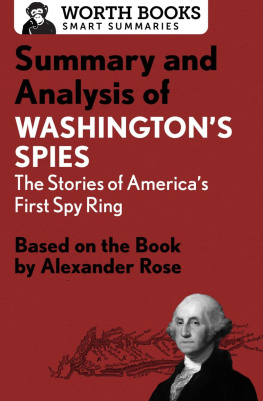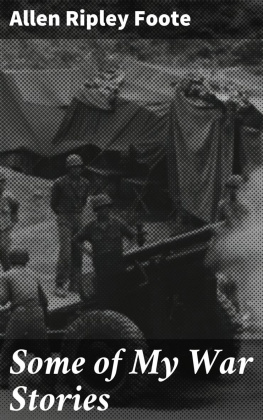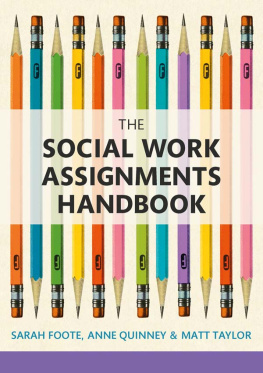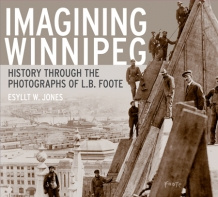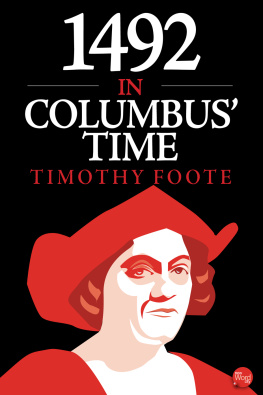Allan Alexander Foote
Handbook for spies

DOUBLEDAY & COMPANY, INC., GARDEN CITY, N. Y., 1949
Copyright, 1949, By Doubleday & Company, Inc. All Rights Reserved
Printed in the United States at The Country Life Press, Garden City, N. Y.
It was a perfectly ordinary front door. Its shining brass knocker, its neat but slightly faded green paint did not distinguish it from thousands of others of its kind. But that door was my entrance to espionage. Beyond that door lay the dim passageway leading through a twilight labyrinth of international intrigue. Once past that door, my feet were set on the road which led me to Germany, to Switzerland and a Swiss jail, beyond the Iron Curtain to Moscow, and back again to Berlin and freedom. When the door closed behind me there began a ten-year episode which was to end with my being condemned as a spy by the courts of one country and sentenced to death by the decrees of another.
It was an autumn day in October 1938. The leaves were still on the trees lining that pleasant road in St. John's Wood, and there was still something of summer in the air as I walked toward the house with the green door the door of the flat where I was to be recruited into the Russian Secret Service.
As a result of my call I was for three vital years of the war a member and, to a large extent, controller of the Russian spy net in Switzerland which was working against Germany. The information passed to Moscow over my secret transmitter affected the course of the war at one of its crucial stages. I was a key link in a network whose lines stretched into the heart of the German high command itself; and it was I who sent back much of the information which enabled the Russians to make their successful stand before Moscow.
This story is entirely factual; every incident and every character is true and genuine. The result may prove disillusioning to those who believe that every brunette is a spy and every blonde a virtuous woman in distress. Actually, of course, the life of a spy is often extremely dull and prosaic. It is the ambition of the good spy to be as inconspicuous and ordinary as possible. Anything out of the ordinary is liable to attract attention or, worse still, arouse suspicion. A suspected spy is well on the way to being an arrested spy, so it can be understood why a spy has a liking for the cloak of mediocrity.
No one trained solely on spy fiction would recognize a spy. It would be possible to parade the whole of the Swiss network before such a man and he would not give them a second glance. What was unusual in wartime Switzerland about a respectable publisher, a well-known military commentator, and an embusque Englishman? Yet these three were the essential core of the Russian spy net against Germany. Nowadays, in peacetime England, the businessman from Canada, the little tobacconist round the corner, or the hearty commercial traveller on the eight-fifteen are far more likely to be Russian spies than any dumb blonde or sinister baron met in Grand Hotel.
It would be equally wrong to regard every Communist as a paid and trained member of the Russian Secret Service. Yet it would be highly injudicious to whisper the secrets of the atom bomb into the ear of a pretty Party member at a cocktail party. She would probably pass the information on as a matter of Party discipline, but she would not be a Russian spy. Spies will have no obvious links with the Communist Party. If they ever were Communists, you will find that they dropped out some time ago at the time of their recruitment. If this seems unbelievable, it is only necessary to look at the various Soviet agents mentioned in this book or in the report of the Canadian spy case. On the face of it they are, or were, nearly all highly respectable members of society with at most only vague leftish leanings. The danger of the avowed Communist lies not in his espionage activities but in his divided loyalty. He is perfectly prepared to be recruited as an agent or to pass on any information which he thinks the Party should know.
So much for the characteristics, or rather lack of characteristics, of a spy. As regards the work, it is not so full of escapes and hurried journeys as fiction would lead one to imagine. The hours are long, much of the work is monotonous, and the pay is not excessive considering the risks. The only excitement a spy is likely to have is his last, when he is finally run to earth. An emotion similar to that experienced by the fox. We are assured that the fox really likes being hunted. I have been hunted; and though the sensation is certainly acute, I can hardly describe it as pleasant and as a fellow sufferer my sympathies are entirely with the fox.
I have attempted to describe the workings of a Soviet spy ring and to indicate the dangers and weaknesses of the Soviet Espionage Service. It would have been easy to embellish the whole thing and produce a sensational document, but I have adhered to the truth. Where the laws of libel permit, and where I knew them, I have used real names. The press cuttings regarding my trial provide the only written evidence I have of the truth of the narrative. If any reader has an entree to the Swiss police archives he will find there an admirable dossier containing much regarding the activities of our organisation. Another easier proof could be provided if I cared to take a journey to Germany and walk into the Soviet Zone. This would perhaps provide only negative evidence, since I would never be heard of again, and it is a step I am reluctant to take at the moment. The condemned criminal seldom prefers to adjust the noose himself.
Condemned I certainly am. When I walked out of the Soviet Zone and gave up my career as a Russian spy I was as surely condemned to death by the Russians as any criminal by a black-capped judge and through the due processes of law. The Soviet system knows only one penalty for failure or treachery death. My colleague Rado failed and is dead. I betrayed and as a result am equally condemned; and the sentence would be executed without mercy or delay were I ever to fall into Russian hands. History has shown the fate of other "traitors," like Krivitsky and Trotsky, who managed to get out and live at liberty for some time. A Russian wall at dawn or the death camps of the N.K.V.D. have seen many who did not achieve even that degree of freedom.
But to return to that flat in St. John's Wood. I pressed the bell and walked in.
"You will proceed to Geneva. There you will be contacted and further instructions will be given you." The voice of my vis-a-vis was quiet and matter-of-fact; and the whole atmosphere of the flat was one of complete middle-class respectability. Nothing could have been more incongruous than the contrast between this epitome of bourgeois smugness and the work that was transacted in its midst. Those seventeen words recruited me into the Red Army Intelligence. That I did not know at the time; nor did I even know exactly what I was expected to do. Indeed, looking round at the room, at those chintz-covered armchairs, those suburban lace curtains, it would have been more appropriate to imagine that I was being engaged as a Cook's courier. But before dealing with the events which succeeded my recruitment, a little background must be given. This will show the stages in the journey which led me to that London flat.
A psychoanalyst would be hard put to find anything in my early life which would indicate that one day I should be running a portion of a Soviet network. My upbringing was as ordinary as that of any child of middle-class parentage brought up between the wars. On leaving school I tried my hand at many jobs, ranging from managing a small business to running a garage, but never found anything which satisfied me for any length of time. I moved from job to job hoping that I would one day find something which suited me.


